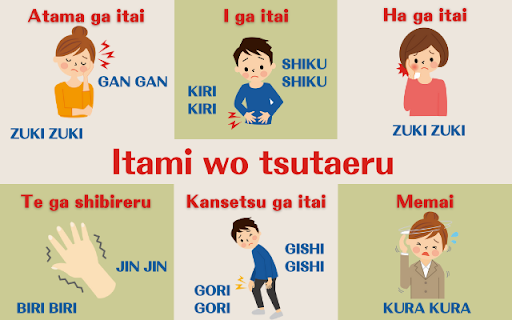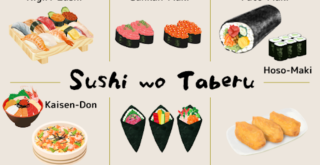
It is painful when you feel pain in your body.
You may feel pain when you are sick, injured, or have stomach pain for an uncertain reason… There are many possible situations.
In Japanese, we don’t use difficult words to describe pain.
It can be conveyed with onomatopoeia, a word made up of a single word combined with other words.
For example, when you go to the hospital with a headache, the doctor may ask you:
“What kind of pain is it?”
How would you answer it?
- Throbbing (zuki zuki)
- Pounding (gan gan)
We use these words when we have a headache.
Today, I will introduce some useful Japanese words that you should know. This way, you could reduce stress of not being able to communicate well even though you are not feeling well.
What kind of pain do you feel?
When your tooth hurt
ずきずき Zuki zuki
When your finger is stuck in a door
じんじん Jin jin
When one has a stomach ache
きりきり Kiri kiri
しくしく Shiku shiku
When you have a sore throat
いがいが Iga iga
When the limbs go numb
じんじん Jin jin
びりびり Biri biri
When the skin is sunburnt
ひりひり Hiri hiri
When you have stomach ache
ちくちく chiku chiku
しくしく Shiku shiku
When your bones or joints hurt
ぎしぎし Gishi gishi
ごりごり Gori gori
When you have a burns and peeling skin
ぴりぴり Piri piri
ひりひり Hiri hiri
Words to use when you’re not feeling well
Dizziness
くらくら Kura kura
Nausea
むかむか Muka muka
When the hands and feet are swollen
ぱんぱん Pan pan
When your heartbeat quickens
どきどき Doki doki
Will the hosipital understand?
「胃がきりきりと痛む」
“E ga kirikiri itamu (I have a splitting stomach ache).”
Most Japanese can imagine what kind of pain it is.
The expression “kiri kiri” is accepted as common knowledge.
Of course, it is also understood in hospitals.
When a doctor asks patients, 「どんな痛みですか」”What kind of pain do you have?”
It is better to use onomatopoeia such as “zuki zuki,” “gan gan,” or “shiku shiku” to convey the pain more accurately than explain it in other ways.
Things to watch out for
It can be complicated until you get used to describing pain.
When you feel a headache, you will realize that it is a throbbing feeling.
It is hard to experience each pain separately.
However, you must be careful not to use the wrong word for pain.
Do not say, “Nodo ga gangan itai (my throat is pounding),” or “Atama ga shikushiku itai (I have a griping pain in my head).”
Let’s first try to apply onomatopoeia to the pain you experience.
It is very useful to know what kind of pain you are experiencing by sensing the location of the pain and the symptoms.
Let’s have fun at Ohanashi Kagawa and learn about what expressions of pain we can use!







